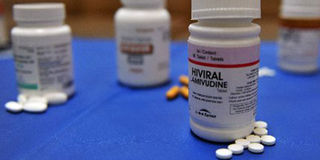Graft putting health care out of reach

The health Ministry’s essential drugs list sets out the importance of ensuring that essential medicines are valued at the lowest price possible to make it affordable to as many people as possible. FILE PHOTO
What you need to know:
- It states that standard goods, services, and works with known market prices shall be procured at the prevailing real market price.
- Inflated prices for medical drugs and other supplies further drive up the cost of health care, alienating most Kenyans from accessing basic health services.
The public health care system remains the main provider of health services in Kenya. Health public procurement is thus vital to this system.
The health Ministry’s essential drugs list sets out the importance of ensuring that essential medicines are valued at the lowest price possible to make it affordable to as many people as possible.
This commitment is threatened by corruption in pharmaceutical procurement.
The law on public procurement governs purchases in all State organs and public entities in Kenya.
It states that standard goods, services, and works with known market prices shall be procured at the prevailing real market price.
Public officials involved in transactions in which standard goods, services, and works are procured at unreasonably inflated prices shall be required to pay the procuring entity for the loss resulting from their actions.
The market prices index is a central pillar of the government procurement system.
It gives price guidelines for over 600 goods and equipment for education, agriculture, public offices, and infrastructure.
It is managed by the Public Procurement Oversight Authority and is publicly available on its website. The quality and accuracy of the market prices index is thus critical in eradicating corruption.
The Society for International Development, Transparency International-Kenya, and the Kenya Ethical and Legal Issues Network sought to establish the accuracy of the market prices index in comparison with local and international market prices.
ACT NOW
The findings of this study are published in a policy brief titled Sealing Corruption Loopholes in Kenya’s Health Procurement System.
At the time of its publication on April 24, 2016, the last available market prices index on the authority’s website was dated June 2015.
This is in disregard of the law on public procurement and asset disposal that requires that the authority issue a quarterly index.
The authority does not name the authors of the market prices index. The website merely states that it is developed by “renowned researchers engaged by Public Procurement Oversight Authority”.
Given the sensitivity of the index, one would expect it to be accompanied by a detailed methodological note and schedule of engagement and its source.
In addition, the market prices index has major and unexplained fluctuations in the cost of essential medicines and equipment.
We found bizarre anomalies between the cost of medical drugs and equipment in Kisumu, Mombasa, and Nairobi.
In the sampling under review, the cost in Kisumu or Mombasa was up to 500 per cent, even though most of the equipment was imported through the port.
A delivery bed, for instance, cost Sh39,357 in Nairobi, Sh49,000 in Mombasa, and Sh114,500 in Kisumu. Ciproflaxin (original) was priced at Sh635 in Nairobi, Sh2,026 in Mombasa, and Sh975 in Kisumu.
Inflated prices for medical drugs and other supplies further drive up the cost of health care, alienating most Kenyans from accessing basic health services.
Something must be done to put our procurement system on track.
The Ministry of Health should institute its own review of the implications of the market prices index and develop and implement a medicines pricing policy for greater transparency, regulation, and uniformity.
RECOVERY OF FUNDS
The President’s office should undertake a review of its ministries and parastatals to surcharge public officials who may have facilitated significant losses through the purchase of inflated goods and services.
The national and county governments, the Kenyatta National Hospital, the Moi Teaching and Referral Hospital, and all the level five hospitals should publish all health-related procurement contracts on their websites and in the media for public scrutiny.
The Ethics and Anti-Corruption Commission, the Directorate of Criminal Investigations, and the Asset Recovery Agency should review and institute proceedings against those found culpable of using the market prices index to inflate prices.
The agencies should recover money from the companies that supplied above-price reference lists.
The public pays the ultimate price for corruption in health — death.
The best cure is for Kenyans to come together to keep the costs of essential medicines and equipment as low as possible by scrutinising health procurement and demanding transparency and uniformity in pricing.
Mr Houghton is associate director, Society for International Development. Ms Ochola is deputy executive director, Kenya Ethical and Legal Issues Network. Mr Kimeu is executive director, Transparency International - Kenya.






